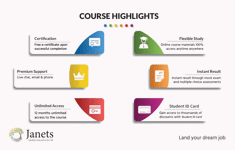Lifeguard: Art of Lifesaving
CPD Certified Diploma | FREE Exam | 24/7 Tutor Support | Lifetime Access | 100% Success Rate
Janets
Summary
- Certificate of completion - £9.99
- Certificate of completion - £15.99
- Exam(s) / assessment(s) is included in price
- Tutor is available to students
Add to basket or enquire
Overview
"Heroes come in all types and sizes, but a lifeguard is a hero that saves lives."
Embark on a life-changing journey with our Lifeguard: Art of Lifesaving course. Designed to educate and empower individuals seeking to make a difference, this comprehensive course covers the essential aspects of professional lifeguarding. Starting with the foundations, you'll learn about lifeguard observation, safety, and risk management to ensure the well-being of swimmers under your watch.
As you dive deeper, immerse yourself in emergency response activities and gain valuable insights into rescuing responsive and unresponsive victims. These essential skills, combined with injury prevention techniques, will equip you to face various aquatic scenarios with confidence and competence.
The final modules delve into first aid, respiratory emergencies, and cardiac emergencies, providing a well-rounded understanding of the many facets of lifeguarding. By completing this course, you will have acquired the knowledge and tools necessary to become a true lifesaver, ready to protect and serve those enjoying the water. So embrace the opportunity to be a hero and learn the Art of Lifesaving today.
Learning outcomes:
Understand the role and responsibilities of a professional lifeguard.
- Develop effective lifeguard observation techniques.
- Implement safety and risk management strategies in aquatic environments.
- Perform emergency response activities with confidence and competence.
- Rescue responsive victims in various water-related situations.
- Manage unresponsive victim rescues efficiently and effectively.
- Apply injury prevention measures to ensure swimmer safety.
- Provide first aid and address respiratory and cardiac emergencies.
Course curriculum:
- Module 01: Professional Lifeguard
- Module 02: Lifeguard Observation
- Module 03: Safety and Risk Management
- Module 04: Emergency Response Activity
- Module 05: Rescuing a Responsive Victim
- Module 06: Rescuing an Unresponsive Victim
- Module 07: Injury Prevention
- Module 08: First Aid
- Module 09: Respiratory Emergencies
- Module 10: Cardiac Emergencies
CPD
Course media
Description
The Lifeguard: Art of Lifesaving course equips participants with the essential knowledge and skills to effectively protect swimmers and respond to emergencies. The course material covers a wide range of topics, from lifeguard observation to injury prevention, ensuring that participants are well-prepared for the challenges of lifeguarding.
Additionally, this course delves into first aid, respiratory, and cardiac emergencies, providing a comprehensive understanding of the many aspects of aquatic safety. Participants will leave the course with newfound confidence in their ability to perform lifesaving interventions and maintain a safe environment for all.
Who is this course for?
- Individuals seeking a career as a professional lifeguard.
- Current lifeguards looking to enhance their skills and knowledge.
- Swimming instructors interested in expanding their aquatic safety expertise.
- A water park or beach attendant aiming to improve their emergency response capabilities.
- Fitness centre employees responsible for pool supervision and safety.
- Individuals passionate about water safety and promoting responsible swimming practices.
Career path
- Lifeguard at public pools, beaches, or water parks: £17,000-£22,000 per year.
- Senior lifeguard or lifeguard supervisor: £20,000-£25,000 per year.
- Aquatics manager or coordinator: £25,000-£35,000 per year.
- Water safety consultant: £30,000-£50,000 per year.
- First aid or CPR instructor: £20,000-£30,000 per year.
- Emergency medical technician (EMT) or paramedic: £22,000-£37,000 per year.
Questions and answers
Currently there are no Q&As for this course. Be the first to ask a question.
Certificates
Certificate of completion
Digital certificate - £9.99
Receive a digital copy of your certificate as a PDF file for only £9.99.
Certificate of completion
Hard copy certificate - £15.99
A physical, high-quality copy of your certificate will be printed and mailed to you for only £15.99.
For students within the United Kingdom, there will be no additional charge for postage and packaging. For students outside the United Kingdom, there will be an additional £10 fee for international shipping.
Reviews
Currently there are no reviews for this course. Be the first to leave a review.
Legal information
This course is advertised on reed.co.uk by the Course Provider, whose terms and conditions apply. Purchases are made directly from the Course Provider, and as such, content and materials are supplied by the Course Provider directly. Reed is acting as agent and not reseller in relation to this course. Reed's only responsibility is to facilitate your payment for the course. It is your responsibility to review and agree to the Course Provider's terms and conditions and satisfy yourself as to the suitability of the course you intend to purchase. Reed will not have any responsibility for the content of the course and/or associated materials.




